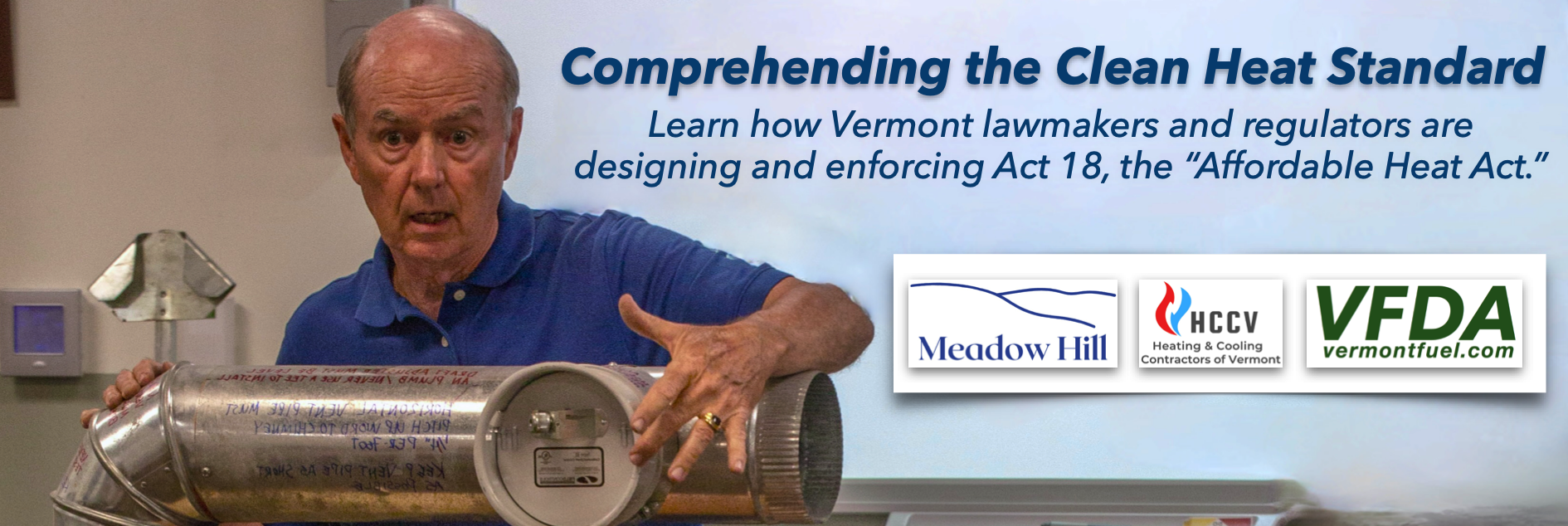
The Vermont Public Utility Commission (PUC) is now designing a “clean heat standard and credit marketplace” in response to Act 18 of 2023. Once called the "Affordable Heat Act," the law is designed to get Vermonters to use less fossil fuels to heat their home. A "clean heat credit" is earned when something is done to reduce greenhouse gas emissions in the thermal sector. About 150 fuel dealers in Vermont will need them, but it isn't clear how many "credits" they'll need and how much they’ll cost. While the work designing this policy is now underway, no payment is required by fuel dealers unless and until the Vermont Legislature gives final approval in 2025.
Meanwhile, these credits are being claimed now. The law allows them to be earned retro-actively as of January 1, 2023. Sales of renewable liquid and solid fuels, weatherization, more efficient heating equipment, wood stoves and the installation of electric heat pumps could be among the list of energy products and services that receive credit. But we don't know for sure as the policy has not been designed. The Public Utility Commission has appointed a Technical Advisory Group (TAG) and an Equity Advisory Group to figure it out. Matt Cota of Meadow Hill was named to both the TAG and the EAG.
According to the “Affordable Heat Act, any company that sells heating fuel “into or in Vermont” is required to register on January 31 and provide details on where the fuel was bought and sold the prior year. Fuel dealers were given less than two weeks to compile and file the necessary information. After several legal filings, the PUC ruled that most of the information submitted in the registry will remain confidential for a period of five years. An extension was also granted. Neither the PUC or the Vermont Attorney General’s Office will seek enforcement action on the basis that a registration is filed late, so long as a registrant submits its annual registration form by February 29, 2024.
A link to the online registry and instructions can be found here.
The experts agree..... the task of designing a "Vermont Clean Heat Standard" is incredibly complex and rushed. And it could end up doing more harm than good with unintended consequences that violate the state's commitment to climate equity.
The Vermont Public Utility Commission (PUC) "shares stakeholders’ serious concerns that any draft rule presented to the Legislature in January 2025 will suffer from the haste demanded by Act 18, which – following the months required to hire the necessary personnel and appoint the necessary committees – allots mere months to the creation of an unprecedented, complex program with the potential for unintended consequences that impact the lives of all Vermonters. In addition, the expedited timeline necessary to deliver a proposed Clean Heat Standard rule by January 15, 2025, is in direct tension with Vermont’s commitments to climate equity."
— from the PUC's Clean Heat Check Back Report found here.
“It seems unlikely that the same degree of attention, deliberation, and thoughtfulness can be applied to address the upcoming issues, which arguably will require more time, resources, and energy than those already addressed. In short, this process is being rushed and policy implications of this work require more time….. It is VFDA and HCCV’s recommendation that the PUC request from the legislature a different timetable to address the magnitude of work that is required to implement the Clean Heat Standard.”
—Matt Cota, Meadow Hill
”VEIC finds the topics the Commission has identified within the drafted RULE schedule as reasonable and appropriate for the development of the rules that will govern the deployment of a Clean Heat Standard but finds the schedule to set a pace that is extremely aggressive and may preclude the opportunity to provide thoughtful responses from all interested or impacted parties.”
— Efficiency Vermont
“And the Department suggests that the Commission consider asking the legislature for an amendment that would allow more time for a deliberative process to design this transformation policy in Vermont.”
— Vermont Department of Public Service
“As a representative of a small organization that expects to participate in this process on behalf of our members, I see the proposed schedule is a barrier to public participation…….I do not see that the proposed process is reasonable or realistic. I am respectfully suggesting that parties cannot do what is proposed, and that the proposed schedule based on the legislation you have been tasked with requires further discussions with the legislature.”
—Vermonters for a Clean Environment
from the Clean Heat Check Back Report found here.